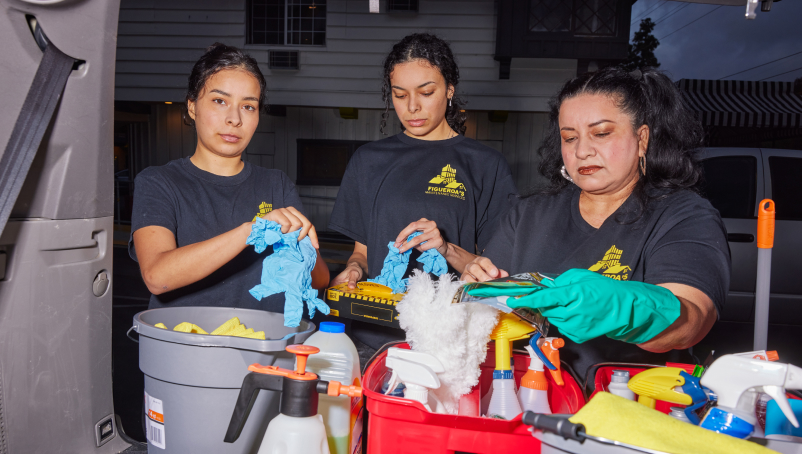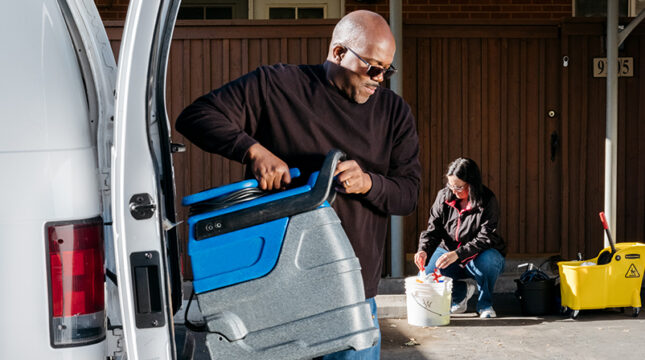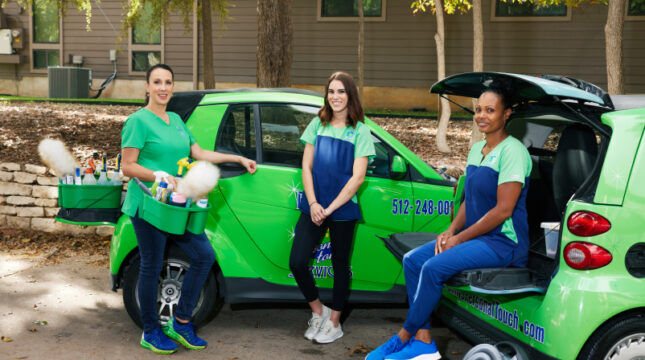How to start a cleaning business in California in 6 steps
- Choose your business structure and register your business
- File a fictitious business statement or DBA
- Apply for an Employer Identification Number (EIN)
- Get protected with the right business insurance for a California cleaning business
- File for a business license
- If you’re selling products, obtain a sales tax permit
Follow these five steps to get your California cleaning business off the ground.
Read more: How to start a cleaning business. Get tips for your business plan, finances and marketing.
1. Choose your business structure and register your business
The first step in starting a cleaning business in California is to choose your business structure. This decision affects everything from taxes to liability and it determines how (or if) you’ll need to register with the state.
Here are the most common business structures for cleaning businesses in California:
- Sole proprietorship: A simple structure for solo business owners. If you’re a sole proprietor, you don’t need to register with the California Secretary of State, but you’re personally responsible for business debts and liabilities.
- Limited liability company (LLC): A popular option for small business owners. LLCs offer asset protection and flexibility. You must register your LLC with the Secretary of State.
- Partnership: A business owned by two or more people. General partnerships aren’t required to register with the state, but limited partnerships and LLPs do need to file.
- Corporation (C corp or S corp): A more formal structure, often used by larger businesses. Corporations must register with the California Secretary of State and meet stricter filing and tax requirements.
If you’re unsure which business entity fits your cleaning business, consider consulting a tax professional or business advisor.
Once you’ve chosen a business structure, your next step is registering your business, if required.
If you formed an LLC, corporation or partnership, you’ll need to register with the California Secretary of State. You can do this online, by mail or in person.
If you’re a sole proprietor using only your legal name (e.g., Jane Smith Cleaning), you’re typically not required to register with the state. But if you operate under a different name (like “Spotless Spaces”), you’ll need to file a fictitious business name, also called a DBA (doing business as) — more on that in the next step.
2. File a fictitious business statement or DBA
If you’re running a business in the state of California under a name different from your legal name, you’ll need to file a “doing business as” (DBA) form, also known as a fictitious business statement. No matter your structure, you’ll need a DBA if your business name differs from your legal name.
You file the DBA form with the county clerk where your business operates. The filing cost varies by county — usually $10-$100.
3. Apply for an Employer Identification Number (EIN)
If your business employs people, operates as a multi-member LLC, is part of a partnership or corporation, you must have an EIN for tax purposes. This is essential for paying employees, managing your business taxes, opening bank accounts and applying for credit.
Getting an EIN is simple. Just go to the IRS website and follow the instructions. You’ll need to provide a name for your business and some basic information like your business address. Applying is free and can be done online.
4. Get protected with the right business insurance for a California cleaning business
The right business insurance in California can do more than just protect your business. It shows potential clients you’re professional and trustworthy — and sometimes, it may be required by law or clients. Common types of small business insurance coverage you might need could include:
General Liability insurance
General liability coverage in California can help protect against some of the most common business risks and accidents. This liability policy can help shield your business from losses associated with non-employees suffering bodily injury at your business (such as a slip-and-fall injury).
It can also be helpful if you or your employees accidentally damage someone else’s property — and you’re on the hook to repair or replace it.
Learn more about general liability for cleaning businesses.
Workers’ Compensation insurance
If you operate a cleaning company in California with at least one part-time or full-time employee you must get workers’ comp insurance. This policy can help cover lost wages and medical expenses if an employee is injured on the job.
Learn more about workers’ comp for cleaning businesses.
Commercial Property insurance
Commercial property coverage can help protect the physical assets you need to do your job, such as a storefront or storage facility, equipment and inventory. It can help safeguard your business property against risks like fire or theft.
Tool and Equipment insurance
If everything you bought for your work — vacuums, window washers, cleaning products, etc. — were to vanish, would you have the funds to replace them all at once?
If your owned or borrowed equipment gets stolen, lost or damaged, this coverage could help you get back to work fast and help with replacement or repairs — in your vehicle, in storage or at a job site.
Tools and equipment coverage is an add-on to general liability insurance for contractors and cleaning businesses.
5. File for a business license
In California, there’s no statewide requirement for a general business license. However, local cities and counties may have their own rules.
Each city or county may have its own license rules based on your services. Contact the city or county clerk’s office where your business will operate for details.
6. If you’re selling products, obtain a sales tax permit
Both residential and commercial cleaning services are not subject to sales tax in California. However, if your cleaning business sells tangible goods, such as cleaning supplies or equipment, you’ll likely need a Sales Tax Permit from the California Department of Tax and Fee Administration (CDTFA). This permit allows you to collect and pay sales tax on your sellable items.






